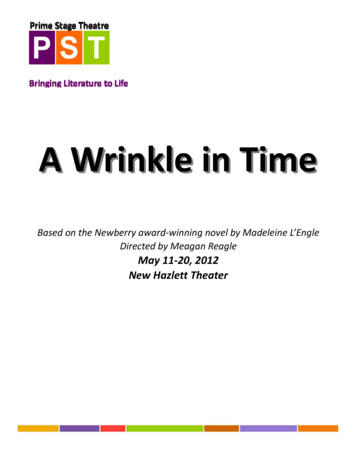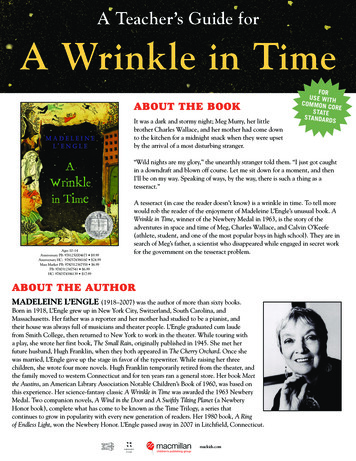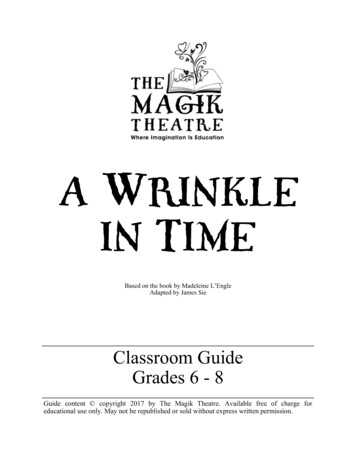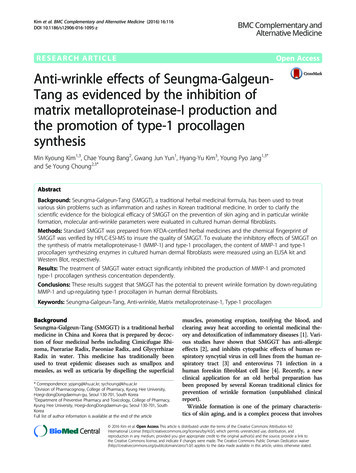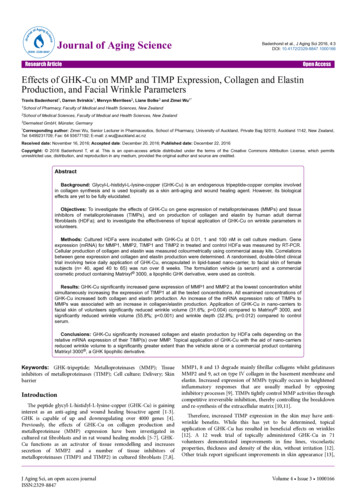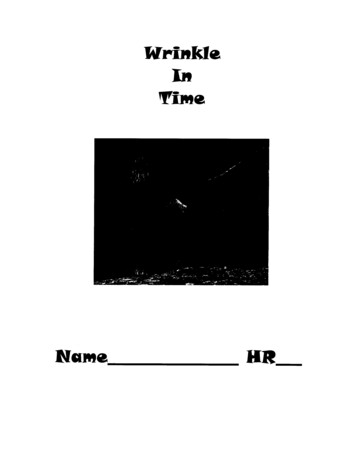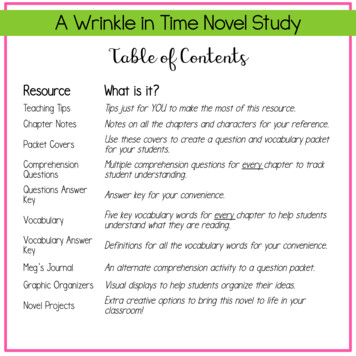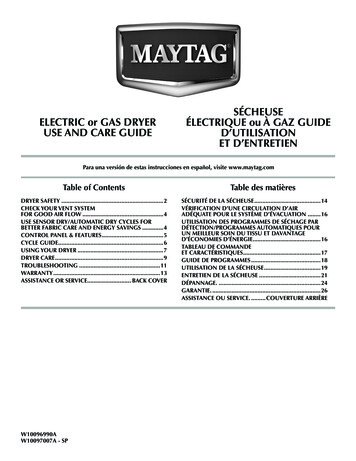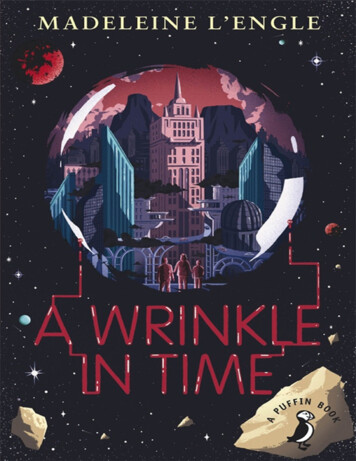
Transcription
Contents1. Mrs Whatsit2. Mrs Who3. Mrs Which4. The Black Thing5. The Tesseract6. The Happy Medium7. The Man With Red Eyes8. The Transparent Column9. IT10. Absolute Zero11. Aunt Beast12. The Foolish and the Weak
MADELEINE L’ENGLE was born in New York City in 1918. She wrote her first story at the age of five– about a little ‘grul’. (No, it wasn’t science fiction – she was a poor speller.) She did poorly in mostof her classes, she said, because she wrote reams of stories and poems when she should have beendoing her schoolwork.When she was twelve she moved to the French Alps with her parents and attended an Englishboarding school in Switzerland. She returned to the United States when she was fourteen, where shegraduated from university with an honours degree in English. Still passionate about reading andwriting, she wrote her first two published novels, and became an actress in order to improve herskills as a playwright.Madeleine L’Engle wrote over sixty books, including A Wrinkle in Time, the first in her TimeQuintet series and winner of the highly prestigious Newbery Medal.She died in 2007, aged 88.
For Charles Wadsworth Camp andWallace Collin Franklin
1. Mrs WhatsitIT WAS a dark and stormy night.In her attic bedroom Margaret Murry, wrapped in an old patchwork quilt, sat on the foot of her bedand watched the trees tossing in the frenzied lashing of the wind. Behind the trees clouds scuddedfrantically across the sky. Every few moments the moon ripped through them, creating wraith-likeshadows that raced along the ground.The house shook.Wrapped in her quilt, Meg shook.She wasn’t usually afraid of weather. – It’s not just the weather, she thought. – It’s the weather ontop of everything else. On top of me. On top of Meg Murry doing everything wrong.School. School was all wrong. She’d been dropped down to the lowest section in her grade. Thatmorning one of her teachers had said crossly, ‘Really, Meg, I don’t understand how a child withparents as brilliant as yours are supposed to be can be such a poor student. If you don’t manage to doa little better you’ll have to stay back next year.’During lunch she’d fooled around a little to try to make herself feel better, and one of the girls saidscornfully, ‘After all, Meg, we aren’t babies any more. Why do you always act like one?’And on the way home from school, walking up the road with her arms full of books, one of the boyshad said something about her ‘dumb baby brother’. At this she’d thrown the books on the side of theroad and tackled him with every ounce of strength she had, and arrived home with her blouse torn anda big bruise under one eye.Sandy and Dennys, her ten-year-old twin brothers, who got home from school an hour earlier thanshe did, were disgusted. ‘Let us do the fighting when it’s necessary,’ they told her.A delinquent, that’s what I am, she thought grimly. – That’s what they’ll be saying next. Not mother.But them. Everybody else. I wish father –But it was still not possible to think about her father without the danger of tears. Only her mothercould talk about him in a natural way, saying, ‘When your father gets back –’Gets back from where? And when? Surely her mother must know what people were saying, must be
aware of the smugly vicious gossip. Surely it must hurt her as it did Meg. But if it did she gave nooutward sign. Nothing ruffled the serenity of her expression.Why can’t I hide it, too? Meg thought. – Why do I always have to show everything?The window rattled madly in the wind, and she pulled the quilt close about her. Curled up on oneof her pillows a grey fluff of kitten yawned, showing its pink tongue, tucked its head under again, andwent back to sleep.Everybody was asleep. Everybody except Meg. Even Charles Wallace, the ‘dumb baby brother’,who had an uncanny way of knowing when she was awake and unhappy, and who would come, somany nights, tiptoeing up the attic stairs to her – even Charles Wallace was asleep.How could they sleep? All day on the radio there had been hurricane warnings. How could theyleave her up in the attic in the rickety brass bed, knowing that the roof might be blown right off thehouse, and she tossed out into the wild night sky to land who knows where?Her shivering grew uncontrollable.You asked to have the attic bedroom, she told herself savagely. – Mother let you have it becauseyou’re the oldest. It’s a privilege, not a punishment.‘Not during a hurricane, it isn’t a privilege,’ she said aloud. She tossed the quilt down on the footof the bed, and stood up. The kitten stretched luxuriously, and looked up at her with huge, innocenteyes.‘Go back to sleep,’ Meg said. ‘Just be glad you’re a kitten and not a monster like me.’ She lookedat herself in the wardrobe mirror and made a horrible face, baring a mouthful of teeth covered with abrace. Automatically she pushed her glasses into position, ran her fingers through her mouse-brownhair, so that it stood wildly on end, and let out a sigh almost as noisy as the wind.The wide wooden floorboards were cold against her feet. Wind blew in the crevices about thewindow frame, in spite of the protection the storm sash was supposed to offer. She could hear windhowling in the chimneys. From all the way downstairs she could hear Fortinbras, the big black dog,starting to bark. He must be frightened, too. What was he barking at? Fortinbras never barked withoutreason.Suddenly she remembered that when she had gone to the post office to pick up the mail she’d heardabout a tramp who was supposed to have stolen twelve sheets from Mrs Buncombe, the constable’swife. They hadn’t caught him, and maybe he was heading for the Murrys’ house right now, isolated ona back road as it was; and this time maybe he’d be after more than sheets. Meg hadn’t paid muchattention to the talk about the tramp at the time, because the postmistress, with a sugary smile, hadasked if she’d heard from her father lately.She left her little room and made her way through the shadows of the main attic, bumping againstthe ping-pong table. – Now I’ll have a bruise on my hip on top of everything else, she thought.Next she walked into her old doll’s house, Charles Wallace’s rocking horse, the twins’ electrictrains. ‘Why must everything happen to me?’ she demanded of a large teddybear.At the foot of the attic stairs she stood still and listened. Not a sound from Charles Wallace’s roomon the right. On the left, in her parents’ room, not a rustle from her mother sleeping alone in the greatdouble bed. She tiptoed down the hall and into the twins’ room, pushing again at her glasses as though
they could help her to see better in the dark. Dennys was snoring. Sandy murmured something aboutbaseball and subsided. The twins didn’t have any problems. They weren’t great scholars, but theyweren’t bad ones, either. They were perfectly content with a succession of B’s and an occasional Aor C. They were strong and fast runners and good at games, and when remarks were made aboutanybody in the Murry family, they weren’t made about Sandy and Dennys.She left the twins’ room and went on downstairs, avoiding the creaking seventh step. Fortinbrashad stopped barking. It wasn’t the tramp this time, then. Fort would go on barking if anybody wasaround.But suppose the tramp does come? Suppose he has a knife? Nobody lives near enough to hear if wescreamed and screamed and screamed. Nobody’d care, anyhow.I’ll make myself some cocoa, she decided. – That’ll cheer me up, and if the roof blows off at least Iwon’t go off with it.In the kitchen a light was already on, and Charles Wallace was sitting at the table drinking milk andeating bread and jam. He looked very small and vulnerable sitting there alone in the big old-fashionedkitchen, a blond little boy in faded blue pyjamas, his feet swinging a good six inches above the floor.‘Hi,’ he said cheerfully, ‘I’ve been waiting for you.’From under the table where he was lying at Charles Wallace’s feet, hoping for a crumb or two,Fortinbras raised his slender dark head in greeting to Meg, and his tail thumped against the floor.Fortinbras had arrived on their doorstep, a half-grown puppy, scrawny and abandoned, one winternight. He was, Meg’s father had decided, part Llewellyn setter and part greyhound, and he had aslender, dark beauty that was all his own.‘Why didn’t you come up to the attic?’ Meg asked her brother, speaking as though he were at leasther own age. ‘I’ve been scared stiff.’‘Too windy up in that attic of yours,’ the little boy said. ‘I knew you’d be down, I put some milk onthe stove for you. It ought to be hot by now.’How did Charles Wallace always know about her? How could he always tell? He never knew – orseemed to care – what Dennys or Sandy were thinking. It was his mother’s mind, and Meg’s, that heprobed with frightening accuracy.Was it because people were a little afraid of him that they whispered about the Murrys’ youngestchild, who was rumoured to be not quite bright? ‘I’ve heard that clever people often have subnormalchildren,’ Meg had once overheard. ‘The two boys seem to be nice, regular children, but thatunattractive girl and the baby boy certainly aren’t all there.’It was true that Charles Wallace seldom spoke when anybody was around, so that many peoplethought he’d never learned to talk. And it was true that he hadn’t talked at all until he was almost four.Meg would turn white with fury when people looked at him and clucked, shaking their heads sadly.‘Don’t worry about Charles Wallace, Meg,’ her father had once told her. Meg remembered it veryclearly because it was shortly before he went away. ‘There’s nothing the matter with his mind. Hejust does things in his own way and in his own time.’‘I don’t want him to grow up to be dumb like me,’ Meg had said.‘Oh, my darling, you’re not dumb,’ her father answered. ‘You’re like Charles Wallace. Your
development has to go at its own pace. It just doesn’t happen to be the usual pace.’‘How do you know?’ Meg had demanded. ‘How do you know I’m not dumb? Isn’t it just becauseyou love me?’‘I love you, but that’s not what tells me. Mother and I’ve given you a number of tests, you know.’Yes, that was true. Meg had realized that some of the ‘games’ her parents played with her weretests of some kind, and that there had been more for her and Charles Wallace than for the twins. ‘IQtests, you mean?’‘Yes, some of them.’‘Is my IQ okay?’‘More than okay.’‘What is it?’‘That I’m not going to tell you. But it assures me that both you and Charles Wallace will be able todo pretty much whatever you like when you grow up to yourselves. You just wait till Charles Wallacestarts to talk. You’ll see.’How right he had been about that, though he himself had left before Charles Wallace began tospeak, suddenly, with none of the usual baby preliminaries, using entire sentences. How proud hewould have been!‘You’d better check the milk,’ Charles Wallace said to Meg now, his diction clearer and cleanerthan that of most small children. ‘You know you don’t like it when it gets a skin on top.’‘You put in more than twice enough milk.’ Meg peered into the saucepan.Charles Wallace nodded serenely. ‘I thought mother might like some.’‘I might like what?’ a voice said, and there was their mother standing in the doorway.‘Cocoa,’ Charles Wallace said. ‘Would you like a liver-wurst-and-cream-cheese sandwich? I’llbe happy to make you one.’‘That would be lovely,’ Mrs Murry said, ‘but I can make it myself if you’re busy.’‘No trouble at all.’ Charles Wallace slid down from his chair and trotted over to the refrigerator,his feet padding softly as a kitten’s. ‘How about you, Meg?’ he asked. ‘Sandwich?’‘Yes, please,’ she said. ‘But not liverwurst. Do we have any tomatoes?’Charles Wallace peered inside. ‘One. All right if I use it on Meg, Mother?’‘To what better use could it be put?’ Mrs Murry smiled. ‘But not so loud, please, Charles. That is,unless you want the twins downstairs, too.’‘Let’s be exclusive,’ Charles Wallace said. ‘That’s my new word for the day. Impressive, isn’t it?’‘Prodigious,’ Mrs Murry said. ‘Meg, come let me look at that bruise.’Meg knelt at her mother’s feet. The warmth and light of the kitchen had relaxed her so that her atticfears were gone. The cocoa steamed fragrantly in the saucepan; geraniums bloomed on the windowsills and there was a bouquet of tiny yellow chrysanthemums in the centre of the table. The curtains,red, with a blue and green geometrical pattern, were drawn, and seemed to reflect their cheerfulnessthroughout the room. The furnace purred like a great, sleepy animal; the lights glowed with steadyradiance; outside, alone in the dark, the wind still battered against the house, but the angry power thathad frightened Meg while she was alone in the attic was subdued by the familiar comfort of the
kitchen. Underneath Mrs Murry’s chair Fortinbras let out a contented sigh.Mrs Murry gently touched Meg’s bruised cheek. Meg looked up at her mother, half in lovingadmiration, half in sullen resentment. It was not an advantage to have a mother who was a scientistand a beauty as well. Mrs Murry’s flaming red hair, creamy skin, and violet eyes with long darklashes, seemed even more spectacular in comparison with Meg’s outrageous plainness. Meg’s hairhad been passable as long as she wore it tidily in plaits. When she went into high school it was cut,and now she and her mother struggled with putting it up, but one side would come out curly and theother straight, so that she looked even plainer than before.‘You don’t know the meaning of moderation, do you, my darling?’ Mrs Murry asked. ‘A happymedium is something I wonder if you’ll ever learn. That’s a nasty bruise the Henderson boy gave you.By the way, shortly after you’d gone to bed his mother called up to complain about how badly you’dhurt him. I told her that since he’s a year older and at least twenty-five pounds heavier than you are, Ithought I was the one who ought to be doing the complaining. But she seemed to think it was all yourfault.’‘I suppose that depends on how you look at it,’ Meg said. ‘Usually no matter what happens peoplethink it’s my fault, even if I have nothing to do with it at all. But I’m sorry I tried to fight him. It’s justbeen an awful week. And I’m full of bad feeling.’Mrs Murry stroked Meg’s shaggy head. ‘Do you know why?’‘I hate being an odd man out,’ Meg said. ‘It’s hard on Sandy and Dennys, too. I don’t know ifthey’re really like everybody else, or if they’re just able to pretend they are. I try to pretend, but itisn’t any help.’‘You’re much too straightforward to be able to pretend to be what you aren’t,’ Mrs Murry said.‘I’m sorry, Meglet. Maybe if father were here he could help you, but I don’t think I can do anythingtill you’ve managed to plough through some more time. Then things will be – easier for you. But thatisn’t much help right now, is it?’‘Maybe if I weren’t so repulsive-looking – maybe if I were pretty like you –’‘Mother’s not a bit pretty; she’s beautiful,’ Charles Wallace announced, slicing liverwurst.‘Therefore I bet she was awful at your age.’‘How right you are,’ Mrs Murry said. ‘Just give yourself time, Meg.’‘Lettuce on your sandwich, Mother?’ Charles Wallace asked.‘No, thanks.’He cut the sandwich into sections, put it on a plate, and set it in front of his mother. ‘Yours’ll bealong in just a minute, Meg. I think I’ll talk to Mrs Whatsit about you.’‘Who’s Mrs Whatsit?’ Meg asked.‘I think I want to be exclusive about her for a while,’ Charles Wallace said. ‘Onion salt?’‘Yes, please.’‘What’s Mrs Whatsit stand for?’ Mrs Murry asked.‘That’s her name,’ Charles Wallace answered. ‘You know the old shingled house back in thewoods that the kids won’t go near because they say it’s haunted? That’s where they live.’‘They?’
‘Mrs Whatsit and her two friends. I was out with Fortinbras a couple of days ago – you and thetwins were at school, Meg. We like to walk in the woods, and suddenly he took off after a squirreland I took off after him and we ended up by the haunted house, so I met them by accident, as you mightsay’‘But nobody lives there,’ Meg said.‘Mrs Whatsit and her friends do. They’re very enjoyable.’‘Why didn’t you tell me about it before?’ Mrs Murry asked. ‘And you know you’re not supposed togo off our property without permission, Charles.’‘I know,’ Charles said. ‘That’s one reason I didn’t tell you. I just rushed off after Fortinbraswithout thinking. And then I decided, well, I’d better save them for an emergency, anyhow.’A fresh gust of wind took the house and shook it, and suddenly the rain began to lash against thewindows.‘I don’t think I like this wind,’ Meg said nervously.‘We’ll lose some shingles off the roof, that’s certain,’ Mrs Murry said, ‘but this house has stood foralmost two hundred years and I think it will last a little longer, Meg. There’s been many a high windup on this hill.’‘But this is a hurricane!’ Meg wailed. ‘The radio kept saying it was a hurricane!’‘It’s October,’ Mrs Murry told her. ‘There’ve been storms in October before.’As Charles Wallace gave Meg her sandwich Fortinbras came out from under the table. He gave along, low growl, and they could see the dark fur slowly rising on his back. Meg felt her own skinprickle.‘What’s wrong?’ she asked anxiously. Fortinbras stared at the door that opened into Mrs Murry’slaboratory which was in the old stone dairy right off the kitchen. Beyond the lab a pantry ledoutdoors, though Mrs Murry had done her best to train the family to come into the house through thegarage door or the front door and not through her lab. But it was the lab door and not the garage doortowards which Fortinbras was growling.‘You didn’t leave any nasty-smelling chemicals cooking over a Bunsen burner, did you, Mother?’Charles Wallace asked.Mrs Murry stood up. ‘No. But I think I’d better go see what’s upsetting Fort, anyhow.’‘It’s the tramp, I’m sure it’s the tramp,’ Meg said nervously.‘What tramp?’ Charles Wallace asked.‘They were saying at the post office this afternoon that a tramp stole all Mrs Buncombe’s sheets.’‘We’d better sit on the pillow cases, then,’ Mrs Murry said lightly. ‘I don’t think even a trampwould be out on a night like this, Meg.’‘But that’s probably why he is out,’ Meg wailed, ‘trying to find a place not to be out.’‘In which case I’ll offer him the barn till morning.’ Mrs Murry went briskly to the door.‘I’ll go with you.’ Meg’s voice was shrill.‘No, Meg, you stay with Charles and eat your sandwich.’‘Eat!’ Meg exclaimed as Mrs Murry went out through the lab. ‘How does she expect me to eat?’‘Mother can take care of herself,’ Charles said. ‘Physically, that is.’ But he sat in his father’s chair
at the table and his legs kicked at the rungs; and Charles Wallace, unlike most small children, had theability to sit still.After a few moments that seemed like for ever to Meg, Mrs Murry came back in, holding the dooropen for – was it the tramp? It seemed small for Meg’s idea of a tramp. The age or sex wasimpossible to tell, for it was completely bundled up in clothes. Several scarves of assorted colourswere tied about the head, and a man’s felt hat perched atop. A shocking pink stole was knotted abouta rough overcoat, and black rubber boots covered the feet.‘Mrs Whatsit,’ Charles said suspiciously, ‘what are you doing here? And at this time of night, too?’‘Now don’t you be worried, my honey.’ A voice emerged from among turned-up coat collar, stole,scarves and hat, a voice like an unoiled gate, but somehow not unpleasant.‘Mrs – uh – Whatsit – says she lost her way,’ Mrs Murry said. ‘Would you care for some hotchocolate, Mrs Whatsit?’‘Charmed, I’m sure,’ Mrs Whatsit answered, taking off the hat and the stole. ‘It isn’t so much that Ilost my way as that I got blown off course. And when I realized that I was at little Charles Wallace’shouse I thought I’d just come in and rest a bit before proceeding on my way.’‘How did you know this was Charles Wallace’s house?’ Meg asked.‘By the smell.’ Mrs Whatsit untied a blue and green Paisley scarf, a red and yellow flowered print,a gold Liberty print, a red and black bandanna. Under all this a sparse quantity of greyish hair wastied in a small but tidy knot on top of her head. Her eyes were bright, her nose a round, soft blob, hermouth puckered like an autumn apple. ‘My, but it’s lovely and warm in here,’ she said.‘Do sit down.’ Mrs Murry indicated a chair. ‘Would you like a sandwich, Mrs Whatsit? I’ve hadliverwurst and cream cheese; Charles has had bread and jam; and Meg, lettuce and tomato.’‘Now, let me see,’ Mrs Whatsit pondered, ‘I’m passionately fond of Russian caviare.’‘You peeked!’ Charles cried indignantly. ‘We’re saving that for mother’s birthday and you can’thave any!’Mrs Whatsit gave a deep and pathetic sigh.‘No,’ Charles said. ‘Now, you mustn’t give in to her, Mother, or I shall be very angry. How abouttuna-fish salad?’‘All right,’ Mrs Whatsit said meekly.‘I’ll fix it,’ Meg offered, going to the pantry for a tin of tuna fish.For heaven’s sake, she thought, – this old woman comes barging in on us in the middle of the nightand mother takes it as though there weren’t anything peculiar about it at all. I’ll bet she is the tramp.I’ll bet she did steal those sheets. And she’s certainly no one Charles Wallace ought to be friendswith, especially when he won’t even talk to ordinary people.‘I’ve only been in the neighbourhood a short time,’ Mrs Whatsit was saying as Meg switched offthe pantry light and came back into the kitchen with the tuna fish, ‘and I didn’t think I was going to likethe neighbours at all until dear little Charles came over with his dog.’‘Mrs Whatsit,’ Charles Wallace demanded severely, ‘why did you take Mrs Buncombe’s sheets?’‘Well, I needed them, Charles dear.’‘You must return them at once.’
‘But Charles, dear, I can’t. I’ve used them.’‘It was very wrong of you,’ Charles Wallace scolded. ‘If you needed sheets that badly you shouldhave asked me.’Mrs Whatsit shook her head and clucked. ‘You can’t spare any sheets. Mrs Buncombe can.’Meg cut up some celery and mixed it in with the tuna. After a moment’s hesitation she opened therefrigerator door and brought out a jar of little sweet pickles. – Though why I’m doing it for her Idon’t know, she thought, as she cut them up. – I don’t trust her one bit.‘Tell your sister I’m all right,’ Mrs Whatsit said to Charles. ‘Tell her my intentions are good.’‘The road to hell is paved with good intentions,’ Charles intoned.‘My, but isn’t he cunning.’ Mrs Whatsit beamed at him fondly. ‘It’s lucky he has someone tounderstand him.’‘But I’m afraid he doesn’t,’ Mrs Murry said. ‘None of us is quite up to Charles.’‘But at least you aren’t trying to squash him down.’ Mrs Whatsit nodded her head vigorously.‘You’re letting him be himself.’‘Here’s your sandwich,’ Meg said, bringing it to Mrs Whatsit.‘Do you mind if I take off my boots before I eat?’ Mrs Whatsit asked, picking up the sandwichnevertheless. ‘Listen.’ She moved her feet up and down in her boots, and they could hear watersquelching. ‘My toes are ever so damp. The trouble is that these boots are a mite too tight for me, andI never can take them off by myself.’‘I’ll help you,’ Charles offered.‘Not you. You’re not strong enough.’‘I’ll help.’ Mrs Murry squatted at Mrs Whatsit’s feet, yanking on one slick boot. When the bootcame off it came suddenly. Mrs Murry sat down with a thump. Mrs Whatsit went tumbling backwardswith the chair on to the floor, sandwich held high in one old claw. Water poured out of the boot andran over the floor and the big braided rug.‘Oh, dearie me,’ Mrs Whatsit said, lying on her back in the overturned chair, her feet in the air, onein a red and white striped sock, the other still booted.Mrs Murry got to her feet. ‘Are you all right, Mrs Whatsit?’‘If you have some liniment I’ll put it on my dignity,’ Mrs Whatsit said, still supine. ‘I think it’ssprained. A little oil of cloves mixed well with garlic is rather good.’ And she took a large bite ofsandwich.‘Do please get up,’ Charles said. ‘I don’t like to see you lying there that way. You’re carryingthings too far.’‘Have you ever tried to get to your feet with a sprained dignity?’ But Mrs Whatsit scrambled up,righted the chair, and then sat back down on the floor, the booted foot stuck out in front of her, andtook another bite. She moved with great agility for such an old woman. At least Meg was reasonablysure that she was an old woman, and a very old woman at that.Mrs Whatsit, her mouth full, ordered Mrs Murry, ‘Now pull while I’m already down.’Quite calmly, as though this old woman and her boots were nothing out of the ordinary, Mrs Murrypulled until the second boot relinquished the foot. This foot was covered with a blue and grey Argyle
sock, and Mrs Whatsit sat there, wriggling her toes, contentedly finishing her sandwich beforescrambling to her feet. ‘Ah,’ she said, ‘that’s ever so much better,’ and took both boots and shookthem out over the sink. ‘My stomach is full and I’m warm inside and out and it’s time I went home.’‘Don’t you think you’d better stay till morning?’ Mrs Murry asked.‘Oh, thank you, dearie, but there’s so much to do I just can’t waste time sitting around frivolling.’‘It’s much too wild a night to travel in.’‘Wild nights are my glory,’ Mrs Whatsit said. ‘I just got caught in a down-draught and blown offcourse.’‘Well, at least till your socks are dry –’‘Wet socks don’t bother me. I just didn’t like the water squishing around in my boots. Now don’tworry about me, lamb.’ (Lamb was not a word one would ordinarily think of calling Mrs Murry.) ‘Ishall just sit down for a moment and pop on my boots and then I’ll be on my way. Speaking of ways,pet, by the way, there is such a thing as a tesseract.’Mrs Murry went very white and with one hand reached backwards and clutched at a chair forsupport. Her voice trembled. ‘What did you say?’Mrs Whatsit tugged at her second boot. ‘I said,’ she grunted, shoving her foot down in, ‘that thereis’ – shove – ‘such a thing’ – shove – ‘as a tesseract.’ Her foot went down into the boot, and grabbingshawls, scarves and hat, she hustled out of the door. Mrs Murry stayed very still, making no move tohelp the old woman. As the door opened, Fortinbras streaked in, panting, wet and shiny as a seal. Helooked at Mrs Murry and whined.The door slammed.‘Mother, what’s the matter?’ Meg cried. ‘What did she say? What is it?’‘The tesseract –’ Mrs Murry whispered. ‘What did she mean? How could she have known?’
2. Mrs WhoWHEN Meg woke to the jangling of her alarm clock the wind was still blowing but the sun wasshining; the worst of the storm was over. She sat up in bed, shaking her head to clear it.It must have been a dream. She’d been frightened by the storm and worried about the tramp soshe’d just dreamed about going down to the kitchen and seeing Mrs Whatsit and having her mother getall frightened and upset by that word – what was it? Tess – tess something.She dressed hurriedly, picked up the kitten still curled up on the bed, and dumped itunceremoniously on the floor. The kitten yawned, stretched, gave a piteous miaow, trotted out of theattic and down the stairs. Meg made her bed and hurried after it. In the kitchen her mother was makingFrench toast and the twins were already at the table. The kitten was lapping milk out of a saucer.‘Where’s Charles?’ Meg asked.‘Still asleep. We had rather an interrupted night, if you remember.’‘I hoped it was a dream,’ Meg said.Her mother carefully turned over four slices of French toast, then said in a steady voice, ‘No, Meg.Don’t hope it was a dream. I don’t understand it any more than you do, but one thing I’ve learned isthat you don’t have to understand things for them to be. I’m sorry I showed you I was upset. Yourfather and I used to have a joke about the tesseract.’‘What is a tesseract?’ Meg asked.‘It’s a concept.’ Mrs Murry handed the twins the syrup. ‘I’ll try to explain it to you later. Thereisn’t time before school.’‘I don’t see why you didn’t wake us up,’ Dennys said. ‘It’s a gyp we missed out on all the fun.’‘You’ll be a lot more awake in school today than I will.’ Meg took her French toast to the table.‘Who cares,’ Sandy said. ‘If you’re going to let old tramps come into the house in the middle of thenight, Mother, you ought to have Den and me around to protect you.’‘After all, father would expect us to,’ Dennys added.‘We know you have a great mind and all, Mother,’ Sandy said, ‘but you don’t have much sense.And certainly Meg and Charles don’t.’
‘I know. We’re morons.’ Meg was bitter.‘I wish you wouldn’t be such a dope, Meg. Syrup, please.’ Sandy reached across the table. ‘Youdon’t have to take everything so personally. Use a happy medium, for heaven’s sake. You just goofaround in school and look out the window and don’t pay any attention.’‘You just make things harder for yourself,’ Dennys said. ‘And Charles Wallace is going to have anawful time. We know he’s bright, but he’s so funny when he’s around other people, and they’re soused to thinking he’s dumb, I don’t know what’s going to happen to him. Sandy and I’ll sock anybodywho picks on him, but that’s about all we can do.’‘Let’s not worry about next year till we get through this one,’ Mrs Murry said. ‘More French toast,boys?’At school Meg was tired and her eyelids sagged and her mind wandered. In social studies she wasasked to name the principal imports and exports of Nicaragua, and though she had looked them updutifully the evening before, now she could remember none of them. The teacher was sarcastic, therest of the class laughed, and she flung herself down in her seat in a fury. ‘Who cares about theimports and exports of Nicaragua, anyhow?’ she muttered.‘If you’re going to be rude, Margaret, you may leave the room,’ the teacher said.‘Okay, I will.’ Meg flounced out.During study hall the principal sent for her. ‘What seems to be the problem now, Meg?’ he asked,pleasantly enough.Meg looked sulkily down at the floor. ‘Nothing, Mr Jenkins.’‘Miss Porter t
Madeleine L'Engle wrote over sixty books, including A Wrinkle in Time, the first in her Time Quintet series and winner of the highly prestigious Newbery Medal. She died in 2007, aged 88. . and this time maybe he'd be after more than sheets. Meg hadn't paid much attention to the talk about the tramp at the time, because the postmistress .

